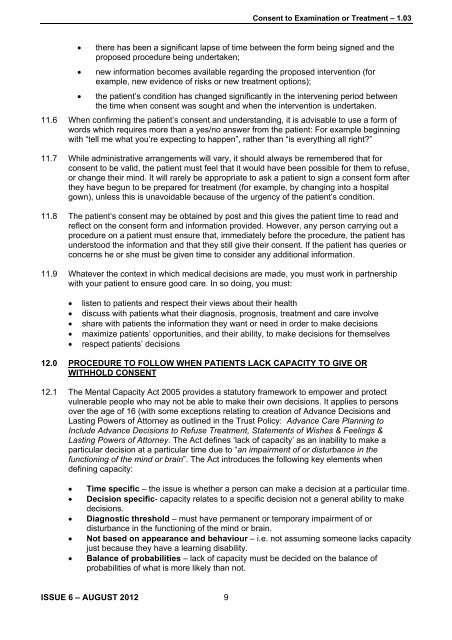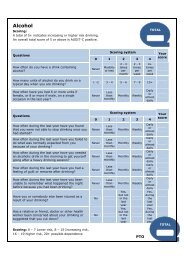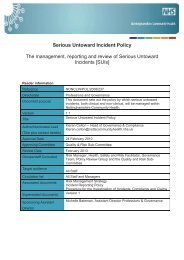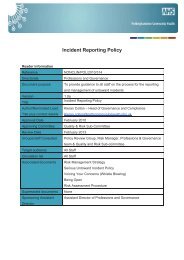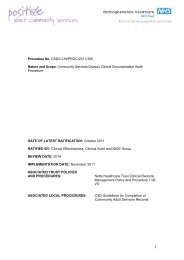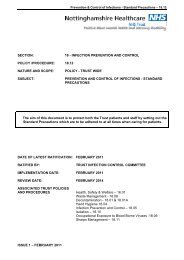Consent to Examination or Treatment Policy - Nottinghamshire ...
Consent to Examination or Treatment Policy - Nottinghamshire ...
Consent to Examination or Treatment Policy - Nottinghamshire ...
Create successful ePaper yourself
Turn your PDF publications into a flip-book with our unique Google optimized e-Paper software.
<strong>Consent</strong> <strong>to</strong> <strong>Examination</strong> <strong>or</strong> <strong>Treatment</strong> – 1.03<br />
• there has been a significant lapse of time between the f<strong>or</strong>m being signed and the<br />
proposed procedure being undertaken;<br />
• new inf<strong>or</strong>mation becomes available regarding the proposed intervention (f<strong>or</strong><br />
example, new evidence of risks <strong>or</strong> new treatment options);<br />
• the patient’s condition has changed significantly in the intervening period between<br />
the time when consent was sought and when the intervention is undertaken.<br />
11.6 When confirming the patient’s consent and understanding, it is advisable <strong>to</strong> use a f<strong>or</strong>m of<br />
w<strong>or</strong>ds which requires m<strong>or</strong>e than a yes/no answer from the patient: F<strong>or</strong> example beginning<br />
with “tell me what you’re expecting <strong>to</strong> happen”, rather than “is everything all right?”<br />
11.7 While administrative arrangements will vary, it should always be remembered that f<strong>or</strong><br />
consent <strong>to</strong> be valid, the patient must feel that it would have been possible f<strong>or</strong> them <strong>to</strong> refuse,<br />
<strong>or</strong> change their mind. It will rarely be appropriate <strong>to</strong> ask a patient <strong>to</strong> sign a consent f<strong>or</strong>m after<br />
they have begun <strong>to</strong> be prepared f<strong>or</strong> treatment (f<strong>or</strong> example, by changing in<strong>to</strong> a hospital<br />
gown), unless this is unavoidable because of the urgency of the patient’s condition.<br />
11.8 The patient’s consent may be obtained by post and this gives the patient time <strong>to</strong> read and<br />
reflect on the consent f<strong>or</strong>m and inf<strong>or</strong>mation provided. However, any person carrying out a<br />
procedure on a patient must ensure that, immediately bef<strong>or</strong>e the procedure, the patient has<br />
unders<strong>to</strong>od the inf<strong>or</strong>mation and that they still give their consent. If the patient has queries <strong>or</strong><br />
concerns he <strong>or</strong> she must be given time <strong>to</strong> consider any additional inf<strong>or</strong>mation.<br />
11.9 Whatever the context in which medical decisions are made, you must w<strong>or</strong>k in partnership<br />
with your patient <strong>to</strong> ensure good care. In so doing, you must:<br />
• listen <strong>to</strong> patients and respect their views about their health<br />
• discuss with patients what their diagnosis, prognosis, treatment and care involve<br />
• share with patients the inf<strong>or</strong>mation they want <strong>or</strong> need in <strong>or</strong>der <strong>to</strong> make decisions<br />
• maximize patients’ opp<strong>or</strong>tunities, and their ability, <strong>to</strong> make decisions f<strong>or</strong> themselves<br />
• respect patients’ decisions<br />
12.0 PROCEDURE TO FOLLOW WHEN PATIENTS LACK CAPACITY TO GIVE OR<br />
WITHHOLD CONSENT<br />
12.1 The Mental Capacity Act 2005 provides a statu<strong>to</strong>ry framew<strong>or</strong>k <strong>to</strong> empower and protect<br />
vulnerable people who may not be able <strong>to</strong> make their own decisions. It applies <strong>to</strong> persons<br />
over the age of 16 (with some exceptions relating <strong>to</strong> creation of Advance Decisions and<br />
Lasting Powers of At<strong>to</strong>rney as outlined in the Trust <strong>Policy</strong>: Advance Care Planning <strong>to</strong><br />
Include Advance Decisions <strong>to</strong> Refuse <strong>Treatment</strong>, Statements of Wishes & Feelings &<br />
Lasting Powers of At<strong>to</strong>rney. The Act defines ‘lack of capacity’ as an inability <strong>to</strong> make a<br />
particular decision at a particular time due <strong>to</strong> “an impairment of <strong>or</strong> disturbance in the<br />
functioning of the mind <strong>or</strong> brain”. The Act introduces the following key elements when<br />
defining capacity:<br />
• Time specific – the issue is whether a person can make a decision at a particular time.<br />
• Decision specific- capacity relates <strong>to</strong> a specific decision not a general ability <strong>to</strong> make<br />
decisions.<br />
• Diagnostic threshold – must have permanent <strong>or</strong> temp<strong>or</strong>ary impairment of <strong>or</strong><br />
disturbance in the functioning of the mind <strong>or</strong> brain.<br />
• Not based on appearance and behaviour – i.e. not assuming someone lacks capacity<br />
just because they have a learning disability.<br />
• Balance of probabilities – lack of capacity must be decided on the balance of<br />
probabilities of what is m<strong>or</strong>e likely than not.<br />
ISSUE 6 – AUGUST 2012 9


